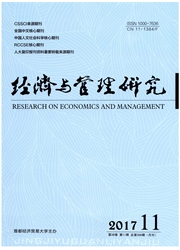

 中文摘要:
中文摘要:
从进入市场、存活以及年龄增长这一动态的演化过程中,企业创新激励的持续性问题一直是理论界悬而未决的问题。本文率先系统性地从经济转轨过程中企业的市场进入和存续出发,考察了企业的不同年龄阶段对创新激励的影响。研究发现,首先,进入企业创新的动机要显著高于存续的企业,中国制造企业存在显著的创新行为的市场选择效应。其次,在企业进入的前9年时间内,新企业存在持续创新激励,不过,新企业的创新激励并非持续增强,呈现倒U型的分布趋势。最后,高新技术行业和资本密集行业是新企业创新激励的重要来源之一,外资和民营企业的创新激励要持续大于国有企业。进一步深化市场化改革,降低市场的制度性壁垒应是中国政府产业组织政策制定的方向。
 英文摘要:
英文摘要:
The sustainability of the enterprise innovation incentive is a theoretical open question from entering the market survive and the growth of the age of this dynamic evolution process. The paper investigates the influence of enterprises from different age stages to innovation incentives under the process of economic transition. The paper finds that,firstly,innovation incentives of the new entrants are significantly higher than that of the surviving firms. Secondly,as the first nine years of entering the market,new firms have persistent innovation incentives,presented by the distribution trend of "inverted U". Finally,the high-tech industry and capital-intensive industry are important for new enterprise motivation,and the innovation from the foreign and private enterprises incentive lasts more than state-owned enterprises. Thus,further deepening the reform of marketization and reducing the market of the institutional barriers should be the direction of industrial organization policy of the Chinese government.
 同期刊论文项目
同期刊论文项目
 同项目期刊论文
同项目期刊论文
 期刊信息
期刊信息
